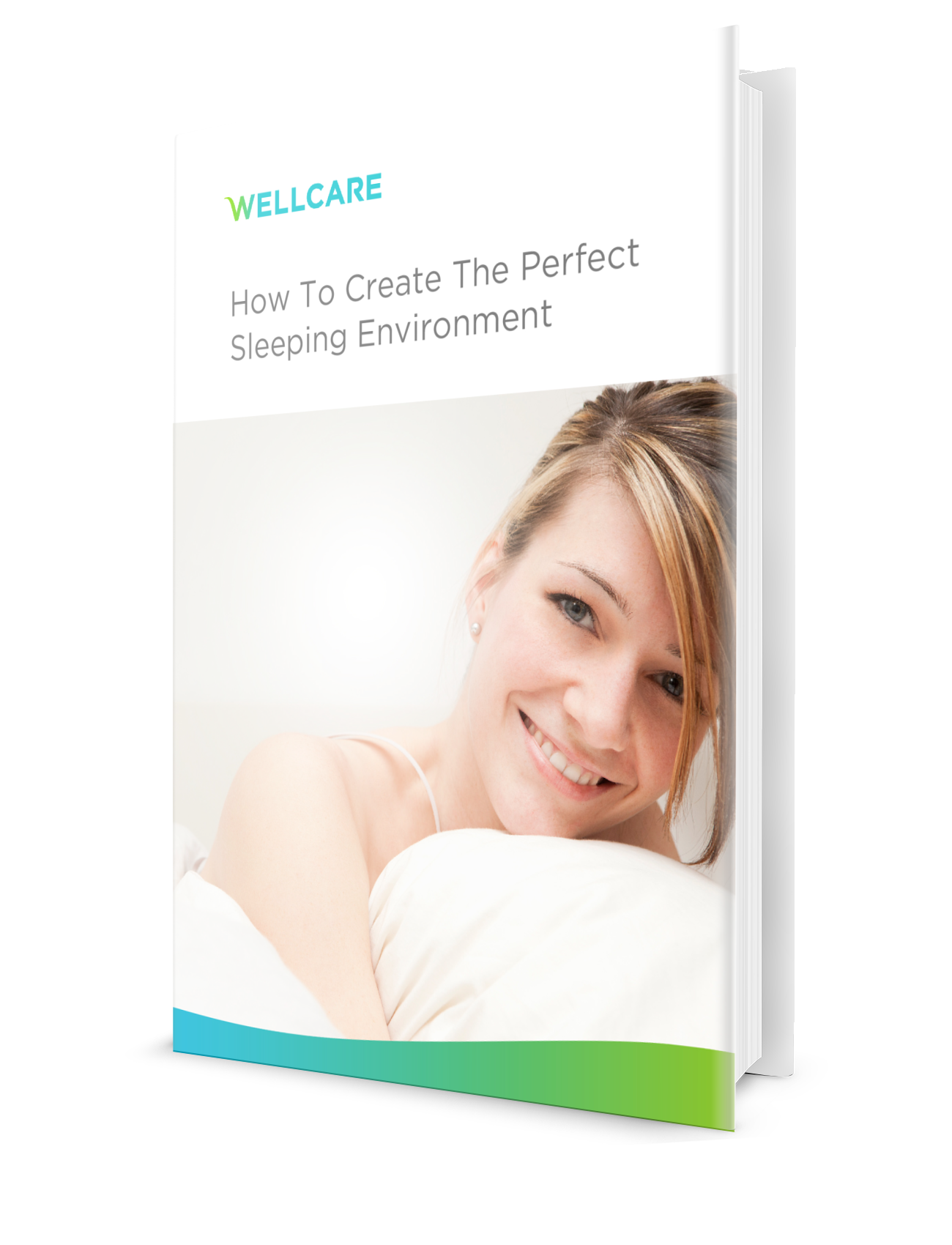
You sleep. I sleep. Just about every organism at least as complex as plankton goes through some form of sleep. Sleeping is one of the most common activities, so to speak, among all life forms—but it’s also one of the most perplexing. To this day, there are scholars who devote their entire careers to understanding the nature of sleep.
According to Hans Fӧrstl, director of the Department of Psychiatry and Psychotherapy at the Technical University of Munich, sleep is a cerebral state that “offers the brain an opportunity to rework and reconnect the information we collected throughout the day.” This view of sleep—as something healing and restorative—is a common one.
After all, even if sleep isn’t primarily about recuperation, there’s no denying its benefits in this regard. There are several benefits associated with good sleeping habits, while sleep deprivation has been linked with several health concerns.
Here are some of the benefits of getting enough sleep on a regular basis.
(How much is enough? We’ll get to that in the section below.)
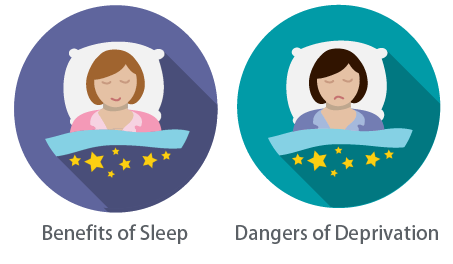
On the other hand, sleep deprivation is linked with an overall reduction in life expectancy, as well as a higher susceptibility to several serious illnesses. Here are some of the detrimental effects of not getting enough sleep:
Reduced Immunity:
Even just one night of little sleep (less than four hours) can reduce the body’s killer cells, which attack cancer cells, by as much as 70%. A chronic lack of sleep also makes your more susceptible to common sicknesses, like the cold and influenza.
It’s worth noting that healing and restoration aren’t the only explanations for why we sleep. Some scientists have theorized that sleep may be a means of conserving energy; this would be an important evolutionary measure, especially for environments where resources are scarce. Another theory is related to brain plasticity: neural connections can be reshaped quicker in a sleeping brain, leading to improved learning, memory, and task mastery.
It is, of course, possible that all of these theories somehow connect. Likewise, it’s possible that we sleep because of some yet undiscovered reason, which connects all these theories. What we can say for certain, however, is that getting too little sleep can be devastating while getting enough sleep does wonders for your health.

They say that you spend about a third of your lifetime sleeping. This would suggest it’s around eight hours a day is normal, but things get more complicated when you take a closer look.
People have been sleeping less and less over the past century. The end result is that the average worker sleeps 1.5 hours less than their counterparts of five decades ago; the average student sleeps nearly two hours less than students a century earlier.
This is a source of concern for researchers and health professionals. In 2014, the US Centers for Disease Control and Prevention labeled sleep deprivation a public health epidemic. In addition to the innate health risks, it has dangerous consequences such as injuries and death resulting from driving or operating machinery while short on sleep.
Solving this, however, would require an understanding of what counts as “enough” sleep. And the answer is more complicated than the old sayings would suggest.
For one thing, the recommended amount of sleep changes as a person ages. Babies usually sleep around 14-17 hours a day, while the elderly average seven or less. In between, the ideal average is less clear. Adults are usually recommended around seven to nine. For adolescents, however, the number is more like eight to ten—and it’s not clear when exactly a person might move from one threshold to the next.
When you consider the actual average duration of sleep among adolescents and adults, that means they’re falling short by one to three hours. This is brought on by a range of factors in environment and routine, which are more likely to affect this age group than the others. These includes:
School:
Adolescents have a different circadian rhythm, which makes it difficult for most of them to sleep (or even feel sleepy) before 11 pm. Because most have to wake up at 6 or 7 am to get to school, they’re just about guaranteed to be getting insufficient sleep—and that’s not even counting their academic and co-curricular demands and often overscheduled after-school hours.
Work:
Electronic communication and international networks have blurred the eight-hour boundary that once encapsulated work. Professionals are now often expected to be available at all hours of the day, which can make it difficult to get to bed at reasonable or regular hours.
Lifestyle:
Your diet and habits—and any deviations from these—can have a considerable impact on how you sleep (more on this in the sections below).
Artificial Light:
Artificial light has become more common in recent years, resulting in “light pollution.” This can disrupt sleep patterns (explained in detail below).
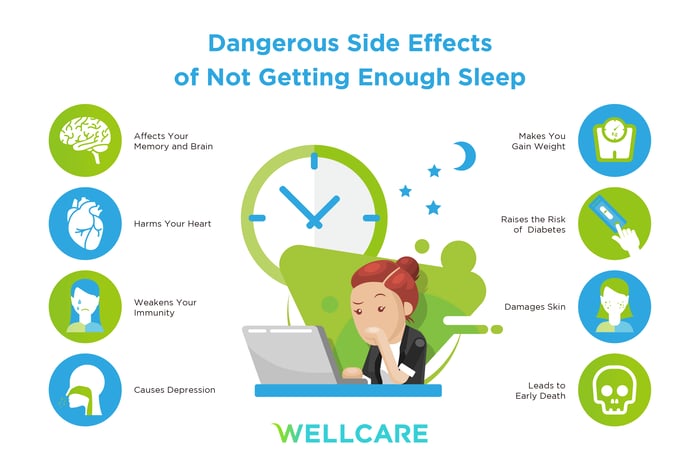
However, while there is a general consensus that sleep deprivation is a widespread problem, there researchers who continue to question what the benchmark for “enough sleep” should be. If sleep is an evolutionary adaptation, as some theories posit, then it could be that the average amount of sleep we need is changing: perhaps we lack sleep, but not by as much as most experts think. Furthermore, history is full of accounts of people getting by with unconventional sleeping patterns that at first would seem unhealthy.
Instead of simply counting hours, it’s important to take into account the end effects: are your sleeping habits keeping you in good health? And if the problem isn’t with the amount you sleep, it could also be with the quality of sleep you’re getting.
Sources: https://www.top10homeremedies.com/news-facts/10-dangerous-side-effects-not-getting-enough-sleep.html
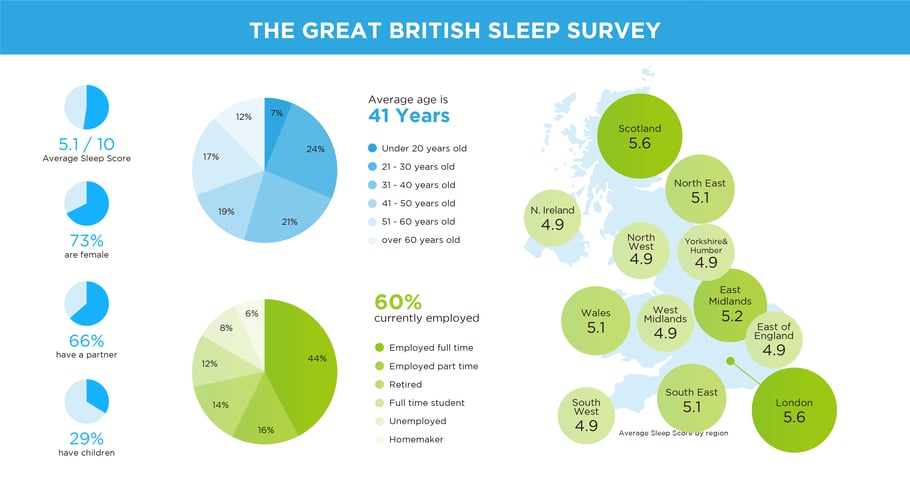
Sources: https://www.sleepio.com/2012report/#respondents1
Here is a survey from Sleepio. The graph on the right side shows us the average score of sleep quality in different area. From the result, we can realize that most British don't have a good
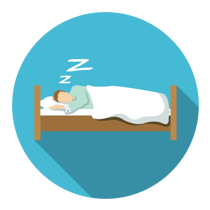
sleep quality.
As anyone could tell you, not all sleep is quite the same. Some nights, even six hours will leave you feeling refreshed. On others, you might spend eight or nine hours in restless slumber.
There are a number of factors that go into a good night’s sleep. Your sleeping environment, routine, diet, medications, and so on can affect your sleep for better or for worse. And how long you can sleep uninterrupted is something to consider, as well. However, for the purposes of determining what constitutes good sleep, perhaps the best place to start is examining the various sleep phases.
Sleep occurs in a total of four stages with a distinction made between the first three stages, which are non-rapid eye movement (non-REM) sleep and the last stage, which is simply called REM sleep.
Stage 1:
This stage occurs within the first few minutes of sleep(often less than ten). It’s light sleep, during which you remain fairly alert to your surroundings and may be easily roused. Muscle activity and eye movement slow down. During this stage, the brain produces alpha waves, which isn’t a significant departure from the waking state.
Stage 2:
This stage is still fairly light and can last up to around 25 minutes. The body begins preparations for deep sleep: eye movements stop, heart rate slows, and body temperature drops. Brain waves begin to slow at this point, with occasional bursts of rapid movement called sleep spindles.
Stages 3:
This stage constitutes deep sleep and can last for around 45-90 minutes. This marks the beginning of our transition from non-REM (rapid eye movement) sleep to REM sleep. During this time, your body is much less responsive to external stimuli, making you much harder to rouse.
People who are woken from this stage of sleep may even be disoriented for awhile. Observations indicate that this is when most physical restoration occurs: the body repairs tissues, stimulates growth, and boosts its immune functions. The brain produces delta waves in slower and slower frequencies as it transitions from stage 3 to REM sleep.
REM (Rapid-Eye-Movement) :
This is the dreaming state, which typically begins after around 90 minutes of non-REM sleep. During this phase, your brain becomes more active, heart rate and blood pressure increase, breathing becomes faster, and your eyes jerk rapidly in different directions (which gives this stage its name). Skeletal muscles, such as those that control your limbs, are paralyzed during this state to ensure that you don’t act out your dreams.
While deep sleep is seen to be the stage when physical restoration occurs, REM is generally seen as the stage where changes in the brain occur. Neural connections are reshaped, making this an important stage for learning and memory.
The full benefits of sleep come from completing multiple sleep cycles each day. A full cycle lasts around 90-120 minutes and an adult will usually go through four or five cycles each night—which leads us to the usual numbers of seven to nine hours of sleep.
However, as mentioned earlier, some people can get by with different arrangements. Rather than counting hours, it may be useful to try counting cycles. Understanding the sleep cycle can help you figure out the ideal duration of a night’s sleep, the best time to wake up, and other similar choices.
So while the best indicator of a good night’s sleep is how you feel throughout the day, it’s also worth noting that sometimes you do “wake up on the wrong side of the bed”—except it’s actually the wrong stage of the sleep cycle. Waking up from deep sleep may leave you groggy for a while, but if you feel better as the day goes on, then you’re likely getting enough quality sleep.
We don’t always sleep a full cycle—there are naps to consider. While they may not last as long, they still adhere to the sleep cycle progression, meaning getting the most out of your naps means knowing which stage to stop at.
Power Naps:
Sleep for 15-25 minutes (reaching Stage 2) for a boost to energy and alertness. Since this is still light sleep, you’ll wake up feeling recharged instead of groggy. A nap this short doesn’t provide genuine recovery, though.
The Siesta:
While siestas aren’t as common as they once were, they’re part of one of the more common sleeping schedules (perhaps second most common, compared to the typical eight hours once per day). A nap of around an hour and a half can take you through a full sleep cycle, providing your muscles with a chance to recover and boosting your creativity and memory.
In Between:
A nap of around 30 minutes to an hour will boost your creativity and prove more restful than a power nap, but will require you to wake from deep sleep. This will probably leave you groggy and disoriented, which may be more troublesome than helpful in the short run.
There’s more to good sleep than stages and cycles. There are a number of factors outside of sleep itself—environmental factors and changes in routine—that can affect the quality of sleep you get. Some can make it harder to get quality sleep, while others can make it easier. If you find yourself having trouble getting good sleep, then consider the following:
In order to sleep soundly, you need to be comfortable and at ease. Environment plays a significant role when it comes to this. While some aspects are fairly obvious—you should be able to sleep without pain or discomfort, free from potential threats—there are some factors people either overlook or don’t realize are affecting their sleep.

Humans possess specialized light receptors that distinguish between bright and dark. To help you sleep, the pineal gland in your brain produces a hormone called melatonin when these receptors signal to the body that it is dark. The abundance of artificial light confuses these receptors, making it difficult to fall asleep.
Blue light, which is the sort emitted by the screens and monitors of electronics, is especially disruptive. It is similar to the sort of light present during daylight, such that the body can take time to adjust after blue light exposure. This, combined with late hours spent on work or entertainment, can lead to significant sleep deprivation.
On the other hand, red, orange, or yellow-coloured lights actually promote a more relaxed sleep. This is because unlike blue light, lights with reddish hues reportedly aid in melatonin production.
Know more : 5 Reasons Why You Shouldn’t Be Sleeping With The Lights On
Even in the deepest stages of sleep, your brain continues to process auditory signals from the environment. So, while it’s obvious that some noises can interrupt sleep, the effects of other sounds may not be as apparent.
Loud noises in general are detrimental to sleep. Even if a noise doesn’t wake you up, it can lower your sleep quality or have other lasting effects. A good environment for sleep should stay within 30 decibels adjusted (dBA), which the American Speech-Hearing-Language Association (ASHA) compares to the level of ambient noise of a library. For comparison, the ASA lists moderate rainfall at 50 dBA, a regular conversation at 60 dBA, and a hair dryer at 94 dBA, among others.
That some people manage to sleep through loud noises is mainly a result of environment and adaptation. While abrupt, loud noises can startle us all out of sleep, most of the noises that wake us are determined by our routine. Noises that might hint at danger or trouble (e.g. a door opening, something breaking, the crying of a baby or the voice of a household member) are most likely to rouse us.
There are also sounds that can help you sleep. Regular, moderate sounds, such as gentle white noise or some forms of music, can cause your brain to synchronize with your slowing heart rate as you enter light sleep. This is the principle behind lullabies, but it works for a wider ranger of sounds than you might expect. For best results, try music at around 60 beats per minute and play it around 30-40 dBA or just a bit softer than your usual speaking voice.

Various aspects of weather can make it either easier or harder to sleep or, at worst, pose certain health risks related to sleeping.
when taken in tandem are the most constant factor affecting sleep. Cool, relatively dry conditions are the most conducive to sleep. Low temperatures help the body’s lower internal temperature stay constant, while relatively dry air makes it easier to regulate when necessary. Conversely, warm humid weather makes it difficult for the body to maintain its ideal resting state.
That said, extremes of cold and dryness are bad for the body, as well. Because body temperature drops when you sleep, exposure to too-cold environments can leave you vulnerable to sickness. Similarly, too-dry air can cause problems with your sinuses.
Seasonal changes can also throw your sleeping patterns off. Changes in temperature and air pressure can lead to joint pains, while pollen and other allergens can cause discomfort as well—all of which may make it difficult to get restful, uninterrupted sleep. Shorter periods of daylight may also leave you feeling drowsy throughout the day, even if the amount of time you sleep stays constant.
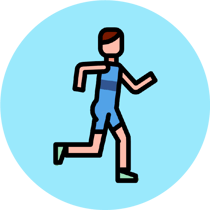
What we do while we’re awake affects how easy it is to fall asleep and how well we sleep when we finally give in to slumber. Here are some things that you can adjust in your daily routine to get better sleep:
Regular exercise leads to better sleep in general. Research from the National Sleep Foundation shows that 150 minutes of moderate to vigorous exercise a week can improve sleep up to 65%, while other studies have shown that sleep generally improves any time you exercise during the day.
What time you exercise can affect sleep too. Because exercise raises blood pressure, heart rate, and body temperature, it would be difficult to sleep right after exercising. It’s best to wait for one hour after exercising before sleeping. Otherwise, however, any time of day is as good as any other—it all depends on your schedule and constraints.
The food, drinks, and other substances you consume throughout the day can also affect your sleep quality. Caffeine and nicotine, in particular, are stimulants that make it difficult to fall asleep. You should avoid them for at least six hours before you intend to sleep. Alcohol may make it easier to nod off but in significant quantities, it can interfere with your sleep cycle, leading to less restful sleep.
It’s also a good idea not to eat or drink too much right before going to bed. Spicy and acidic food, in particular, could lead to stomach trouble, while refined carbohydrates (e.g. white bread, white rice, pasta) can keep up. Drinking too much might lead to sleep disruptions when you need to go to the bathroom.
How can you tell if you’re sleeping well? Sometimes the best way to judge is simply to observe yourself. Try to analyze these habits to see if you’re sleeping well.
Falling and Staying Asleep:
If it takes you 30 minutes or less to fall asleep, you’re in good territory. If it often takes longer for you to fall asleep, that’s a sign of trouble.
Similarly, frequent or prolonged interruptions of sleep signal trouble. If you find yourself awake in the middle of the night for more than 20 minutes (despite trying to get back to sleep), that may signal insomnia or other sleep problems. In other words, some disruptions—going to the bathroom or turning over—are normal; too much are a sign of troubled sleep.
Staying Awake:
It’s also a problem if you’re too quick to fall asleep—when you don’t want to. If you find yourself drifting off throughout the day, that probably means you’re lacking quality sleep.
Pay attention to whether you stave this off with coffee or other stimulants. If you’re only awake because of the caffeine, that means you’re not getting enough sleep.
Dreams:
Certain dreaming patterns can hint at sleep quality, though it can be tricky to interpret them. Having good dreams (which is to say ones that aren’t nightmares) is a sign of healthy sleep reaching REM. However, most people won’t remember these unless they wake up in the middle of them, which isn’t the best thing to have happen to you.
On the other hand, nightmares or disruptively vivid dreams can point to a lack of sleep. When people don’t get enough REM sleep, the brain tends to “rebound,” entering into an excess of stressful dreams.
Mind and Mood:
Do you find your thoughts shifting track throughout the day? Is it hard to concentrate on prolonged tasks? Do you flick distractedly from one browser window to the next, or from desktop to phone and back? These could all hint at a lack of sleep, which makes it harder for the brain to stick to one process.
Similarly, if your moods fluctuate from one to another, that may also be a sign of poor sleep.
Weight and Appetite:
Are you gaining weight despite an otherwise steady routine? Sleep deprivation can cause your body to hoard nutrients for extra energy—even if these nutrients aren’t quite what you need. Because of this, sleep deprivation can lead to weight gain or an accumulation of belly fat, also called visceral fat.
Nocturnal Activities:
Other nocturnal activities can hint at sleep problems. If you’re walking or talking while you sleep, you’ll get lower sleep quality (and could run into other problems). If you’re kicking off the blanket, you may be sleeping in too much humidity or heat.
Either way, if you find yourself doing things that normally shouldn’t happen while you sleep, you’re probably not sleeping as well as you think.

Ultimately, getting the best sleep you can will require your personal judgment. You’ll have to observe your habits, consider your schedule constraints, and see what works for you. But if you’re looking for a quick, simple starting point, these are some things you can do to get better sleep. Try them out and, after considering the points above, come up with your own plan for restful nights (or days, if that’s how your schedule works).
1. Set a Regular Sleeping Schedule
Sleeping at irregular hours throughout the week leads to poor sleep quality. Besides, knowing what time you’re going to bed will let you adjust the rest of your routine for better sleep.
2. Adjust Your Diet and Exercise
Leave at least an hour between exercise and sleep. Don’t eat or drink too much before sleeping, especially caffeine and alcohol. Avoid nicotine, as well.
3. Find What Relaxes You
Some examples are aromatherapy, warm baths, and meditation. Remember that this relaxation should put both body and mind at ease, including a lower body temperature, heart rate, and regular breathing.
4. Maintain a Comfortable Environment
Make sure the place where you sleep is quiet, cool, and relatively dry. Make sure you can block out all unwanted light, especially sunlight (if you have to sleep during the daytime) and blue light (see above).
5. Use High-Quality Furniture and Beddings
Good mattresses, pillows, and blankets are well worth the investment. Electric blankets and underblankets are useful for getting better sleep, even outside the winter months.
With sleep deprivation a widespread problem these days—and all the factors leading to it—you may find yourself facing sleep disorders at some point in your life. Non-chronic insomnia or acute insomnia are fairly common sleep disorders. Or you mind find it hard to fall asleep to a degree that is less severe but still bothersome.
Here are a few common causes for these problems and what you can do about them:
Chronic Body Pain
Aches stemming from back issues, arthritis, rheumatism, fibromyalgia, and other conditions cause discomfort that can prevent you from falling asleep.
Simple solutions such as massages or heat therapy may work for simple cases. More persistent or complex pains may require medication. Note however, that some pain relievers can also lower sleep quality (see below).
Stress, Anxiety, and/or Depression
When you’re feeling anxious, stress, or depressed, your mind races and becomes restless. Irregularity in sleep patterns are sometimes signs of medical illness, as well. You should see a psychiatrist if you suspect you are experiencing any of these conditions.
Medications
Some drugs like anti-inflammatory steroids, antidepressants, and pain relievers disrupt your body’s production of melatonin, which is responsible for regulating your normal sleep/wake cycle. If the medicine causing your sleeping problems was prescribed, you should consult the physician who gave the prescription. If it’s non-prescription medicine, you should minimize use or switch to an alternative that doesn’t disturb your sleep.
That said, not all problems can be solved with simple adjustments to your environment and routine. If you experience serious problems or disorders related to sleep, it’s best to see a specialist. These problems include:
Chronic Insomnia
The most well-known manifestation of insomnia is consistently having difficulty falling asleep. If it regularly takes you more than an hour to fall asleep, you should consult a specialist. Other forms of insomnia, however, involve being unable to get restful sleep (even if sleep comes easily) or being unable to sleep uninterrupted through the night.
Sleep Apnea
This is a respiratory problem marked by breathing stopping frequently throughout the night. Common symptoms are feeling unrested even after a full night’s sleep, as well as loud snoring—so if your roommates or household are complaining, you should take serious steps to stop snoring.
Parasomnia
This refers to a broad category of sleep disorders abnormal movements, behaviors, emotions, and perceptions during sleep or while falling into, or awakening from it. Some common types of parasomnia are sleepwalking, in which a person moves while sleeping without realizing it, sometimes involving more complex actions than walking; and sleep paralysis, in which a person may be awake while dreaming, unable to move their body while dream-like figments encroach upon their lucid thoughts.
Although we can’t control what happens to us while we sleep—except perhaps for lucid dreamers, to a degree—we can influence the quality of our sleep by adjusting our habits outside of and during slumber.
When asked if modern society was plagued by sleep deprivation, Hans Fӧrstl (whose definition of sleep we quoted from), said “modern life is just too interesting to sleep longer.” While he may be on to something, it nonetheless stands that we can’t appreciate life to the full if a lack of sleep leaves us with our senses blunted and our wits dulled.
It’s in each person’s best interest to pay close attention to their sleep habits and quality, especially under the influence of rapidly changing technology and societal norms. Sleep is a natural pleasure of life, much like food, drink, and recreation. It’s hard to deny how much better a day is when you’ve slept well compared to when you haven’t—and sleeping well is very much in your control.
For more on sleeping well and living better, keep an eye on our blog.
"How to create the perfect sleeping environment"
Not being able to sleep well has become a big problem for everyone in the world. Nowadays, we all experiencing much more mental stress and that is making us hard to relax.
Are you looking for ways to get a better night of sleep? Building a comfortable environment is crucial to falling asleep and rest well.
Would you like to sleep better and gain more energy the next day? If so, this "How to create the perfect sleeping environment" Ebook is perfect for you.
